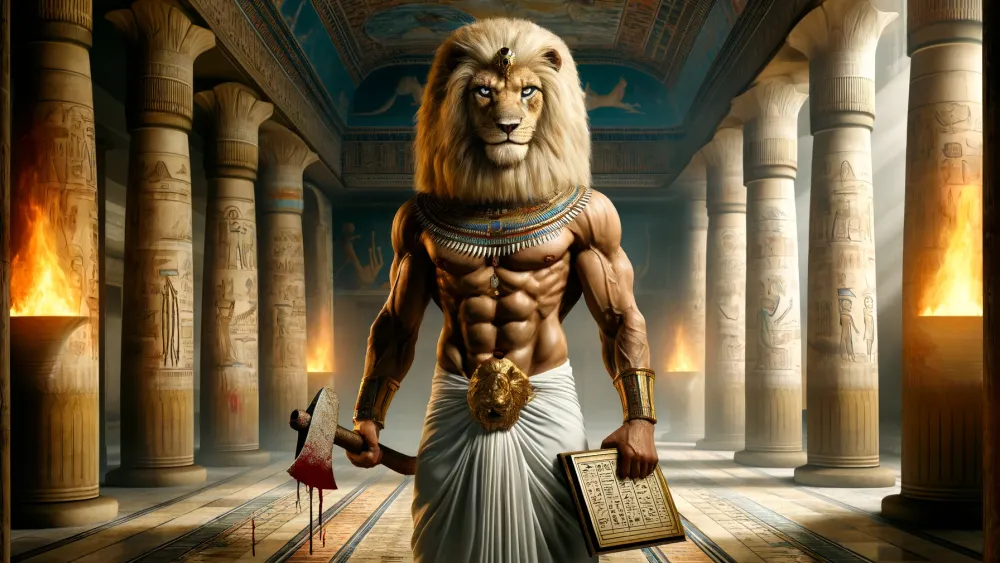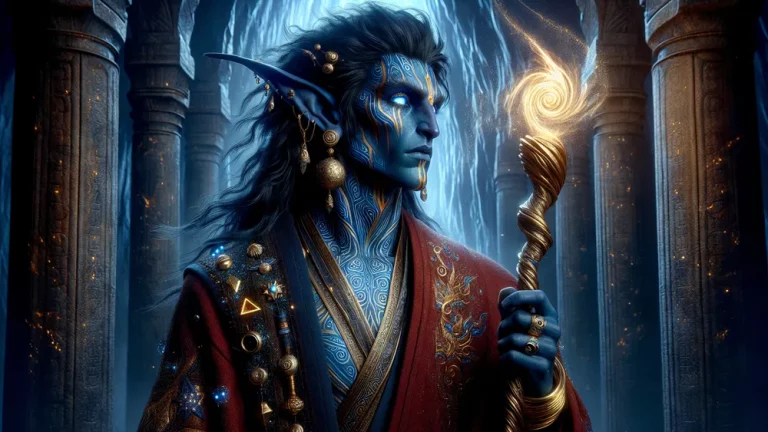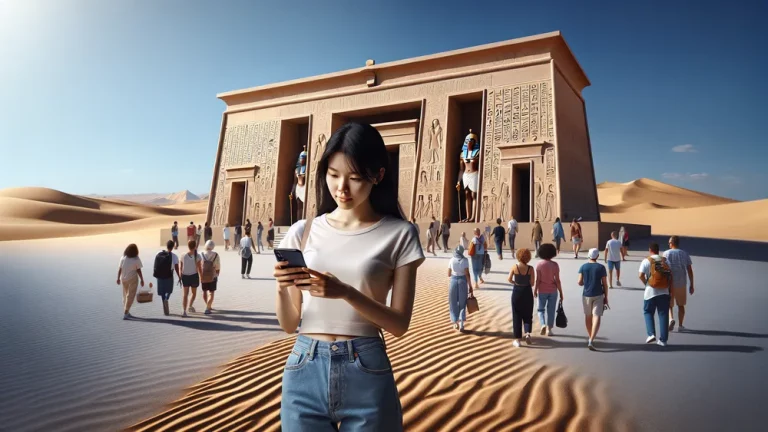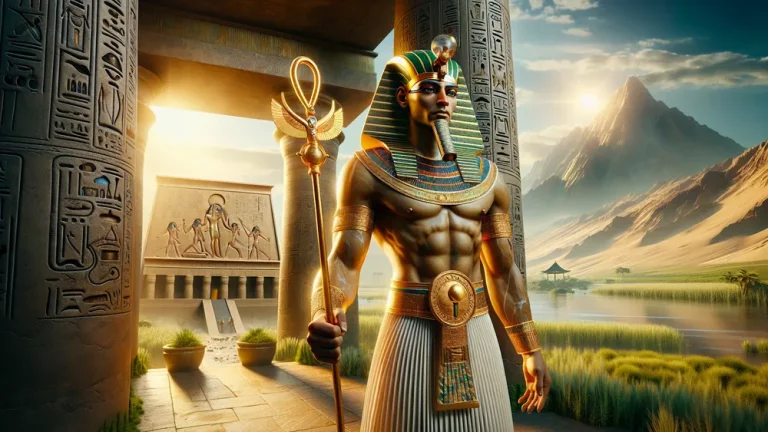Shezmu: Egyptian Deity Of Execution And Perfume
In the colorful world of ancient Egypt, Shezmu stands out. He’s not just any god; he’s a mix of executioner and perfume maker. Imagine that! Shezmu’s story is full of twists. He helps make wine, creates perfumes, and guards the dead. His influence? It’s everywhere in Egyptian life and rituals. This blog dives into Shezmu’s many sides – his looks, his jobs, and his place among other gods.
Key Points:
- Shezmu is an Egyptian deity of execution and perfume.
- He is a mix of an executioner and a perfume maker.
- Shezmu’s roles include guarding the dead and punishing the wicked.
- He is symbolized by a lion’s head and often seen with a wine press or oil jars.
- Shezmu is essential in winemaking and perfume making in ancient Egypt.
- His influence is seen in rituals, art, and stories throughout Egyptian history.
Shezmu: Overview and Key Facts
| What | Details |
|---|---|
| Name | Shezmu (or Shesmu, Shesmou) |
| Job | God of killing, wine, and perfume |
| Two Sides | Guardian of the dead and scary executioner |
| Looks Like | Lion’s head, sometimes with a wine press or oil jar |
| Symbols | Wine press, lion, oil jars, blood |
| Worship Places | Faiyum region, Edfu, Dendera |
| Myth Friends and Foes | Linked to Osiris, Horus, Thoth, Apep |
| Rituals and Gifts | Wine, perfumes, prayers for afterlife safety |
| Death Role | Helps in embalming and keeping the dead safe |
| History Pathway | Worshiped from Old Kingdom to Greco-Roman times |
| Cultural Footprint | Shapes Egyptian rituals, art, stories |
Shezmu: The Multifaceted Deity
Shezmu’s tale? A wild ride of twists and turns. Ready to explore his many faces and roles? Let’s jump in!
Shezmu’s Dual Nature: Protector and Destroyer
Shezmu wears two hats – one as a helper and the other as a punisher. On one hand, he protects the dead, making sure they are safe in the afterlife (like a guardian angel but for mummies). On the other hand, he acts as a fierce executioner, punishing the wicked (think of a judge who also swings the axe). This mix makes him stand out among Egyptian gods. He is both feared and loved. Here’s a quick look at his roles:
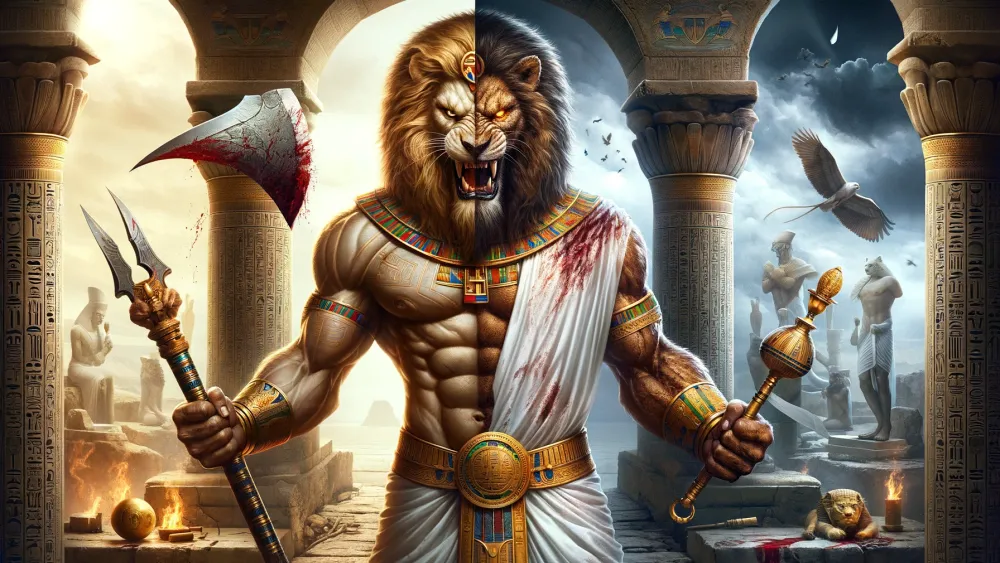
- Protector of the Dead: Guards the deceased, ensuring their safe passage to the afterlife.
- Fierce Executioner: Punishes the wicked, often depicted crushing heads in a wine press (a gruesome but symbolic act).
- Benefactor: Provides wine and perfumes, essential for rituals and daily life in ancient Egypt.
Shezmu’s Iconography and Representations
In ancient Egyptian art, Shezmu often shows up with a lion’s head. This fierce look (like a superhero with a scary mask) tells us he means business when punishing the wicked. But wait, there’s more! He also appears with a wine press or oil jars, showing his love for making wine and perfumes (think of a chef with his favorite tools). These symbols paint a vivid picture of his many roles. Here’s a quick peek at how he’s depicted:
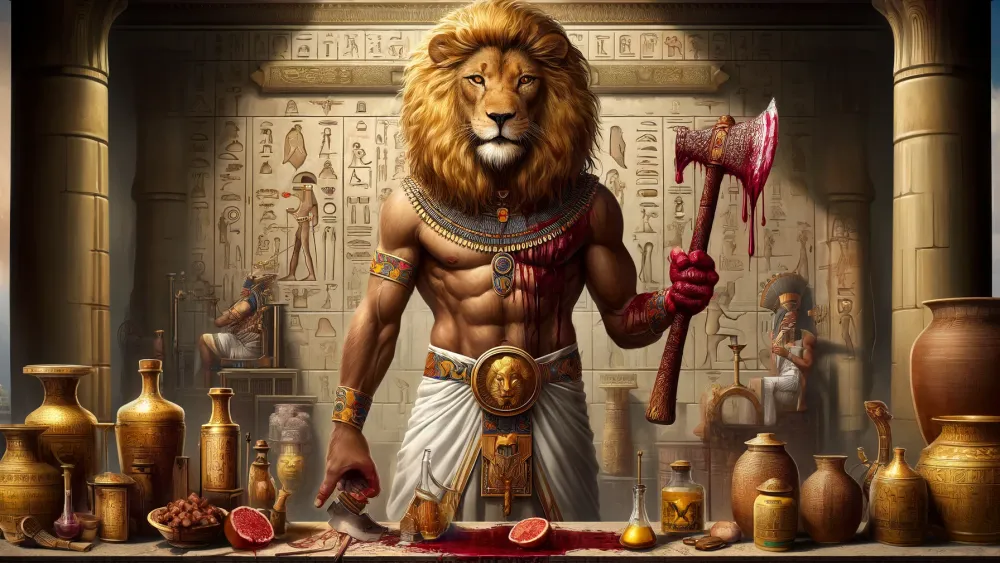
- Lion-Headed Form: Shows off his fierce, punishing side.
- Wine Press: Tells us about his winemaking skills.
- Oil Jars: Highlights his perfume-making talents.
- Blood and Wine: Often seen with these, linking him to both life and death.
Shezmu’s Role in Winemaking and Perfume
Alright, buckle up! Let’s jump into Shezmu’s wild world of winemaking and perfume. These roles? They show off his unique character even more.
The Wine Press: Shezmu’s Domain
Shezmu, the lion-headed god, rules winemaking in ancient Egypt. He squashes grapes in a wine press (a big, heavy machine that crushes grapes to get juice) to make wine. But wait, it’s not just about making a tasty drink. Wine means blood and life, linking Shezmu to both creation and destruction.
In his cult, wine plays a huge role in rituals and offerings (think of it as a sacred drink). People believe Shezmu’s wine can purify and protect, making it super important in ceremonies.
Shezmu, the lion-headed god, is closely connected to winemaking in ancient Egypt, with wine symbolizing blood, life, creation, and destruction, playing a crucial role in rituals due to its perceived purifying and protective qualities.
Shezmu and the Sacred Art of Perfume Making
Shezmu, the scent wizard, rocks at making perfumes. He squeezes oils from plants and flowers (like getting juice from an orange) to whip up amazing scents. But these aren’t just for smelling good. In ancient Egyptian rituals, these perfumes mean a lot. They honor gods and clean spaces spiritually. Imagine sweet smells acting like a bridge between humans and gods. That’s Shezmu’s magic!
His perfumes stand for purity and protection, super important in religious practices.
The Fragrance of Death: Perfume in Funerary Practices
In ancient Egypt, perfumes and oils play a huge role in funerals. During embalming (preserving a body), they use these scents to clean and protect the dead. Imagine using soap and lotion but for a much deeper purpose. Shezmu, the perfume god, runs this show. His job is super important. He makes sure they use the right oils to purify the body and get it ready for the afterlife. These scents aren’t just for covering up smells; they have deep spiritual meaning. They help the soul move smoothly to the next world. Check out this quick table of key oils and their uses:
| Oil/Perfume | Use in Funerary Practices |
|---|---|
| Cedar Oil | Cleanses and preserves the body |
| Myrrh | Purifies and protects the soul |
| Frankincense | Connects the soul to the divine |
Shezmu’s skill with perfumes makes him essential in these rituals, making sure the dead are honored and ready for their journey.
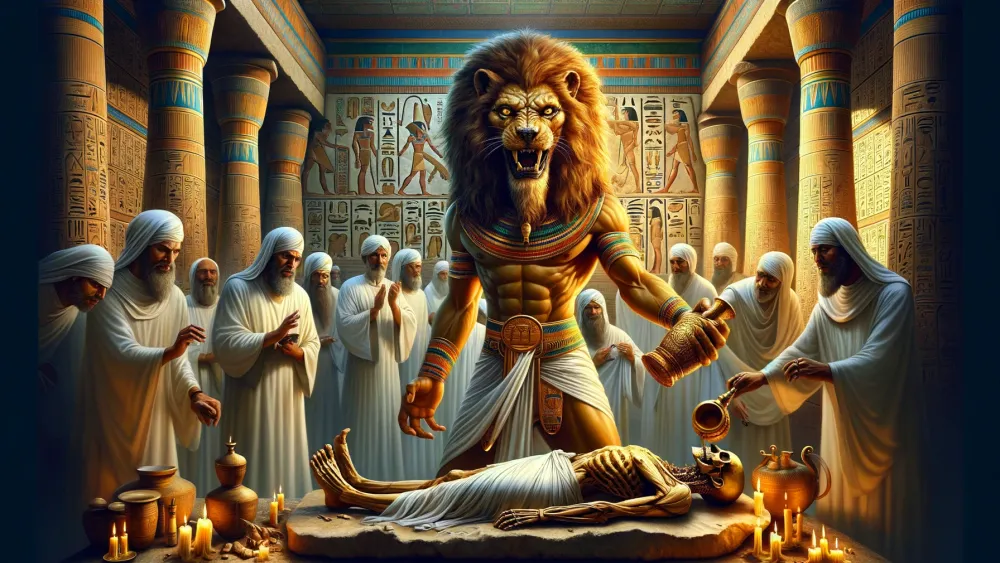
Shezmu’s Influence in the Afterlife
Shezmu’s job isn’t done with just perfumes and embalming. His power reaches deep into the afterlife, guiding souls and keeping them safe on their journey.
Shezmu’s Role in the Preservation of the Dead
Shezmu, the embalming wizard, works magic to keep bodies fresh. He uses special oils and perfumes (like a chef with spices) to stop decay. This isn’t just about looks; it’s about prepping for the afterlife. In ancient Egypt, a well-preserved body is super important. It helps the soul find its way back.
Shezmu’s skills make sure bodies stay in tip-top shape, ready for their big journey. He also acts like a bodyguard, keeping evil spirits away from the dead. His influence is like an invisible shield, protecting and preserving all at once.
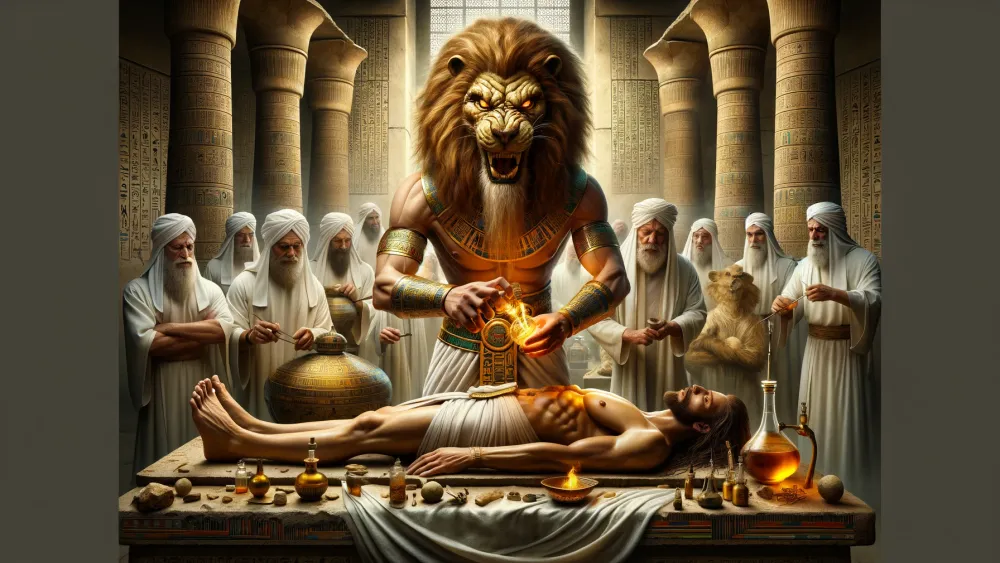
Shezmu in the Osiris Mythology
Shezmu, a big deal in Osiris’s world, helps out with afterlife stuff. Osiris, the boss of the dead, counts on Shezmu for judging souls. Picture Shezmu as Osiris’s lion-headed sidekick (or muscle). He doesn’t just handle embalming; he also joins in on the heart-weighing ceremony. This ceremony checks if a soul deserves to enter the afterlife.
Shezmu’s fierce side (he crushes bad guys’ heads) makes sure only good souls get through. In the bigger picture of Egyptian beliefs about death and rebirth, Shezmu is super important. He connects life and afterlife, making sure everything goes smoothly. His dual nature (both protector and punisher) fits right into the cycle of death and rebirth.
While Osiris stands for new beginnings, Shezmu makes sure only those who earn it get to start over. This mix of kindness and justice is key in Egyptian stories, making Shezmu a major player in their grand tale.
Shezmu plays a crucial role in Egyptian beliefs, acting as a key figure in judging souls for the afterlife, balancing kindness and justice in the cycle of death and rebirth.
Offerings and Prayers to Shezmu
People give Shezmu all kinds of stuff and say special words to get his protection in the afterlife. They think these gifts and prayers help them stay safe on their journey. Common offerings include wine, bread, and oils (like giving a friend their favorite snacks). These things show Shezmu’s roles in making wine and embalming bodies.
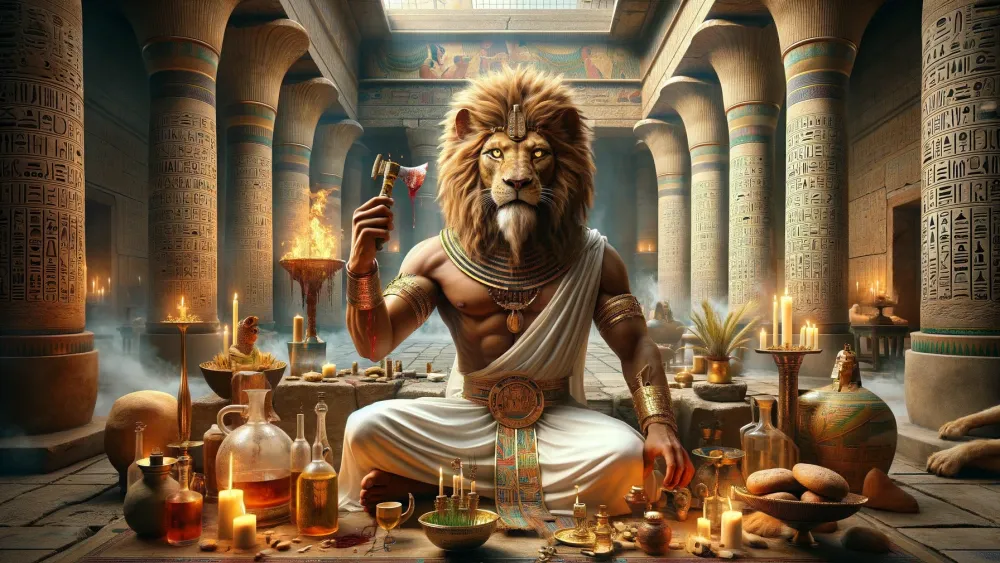
Rituals often involve pouring wine on altars and burning incense (to make Shezmu happy). Prayers to Shezmu usually ask for his strength and protection. People say these prayers during funerals and other ceremonies. They might say things like: “Shezmu, guard my soul” or “Keep evil spirits away.” These words show respect and ask for help.
By giving offerings and saying prayers, people hope Shezmu will watch over them and keep them safe in the afterlife.
Shezmu’s Relationships with Other Deities
Shezmu doesn’t do his thing alone. He hangs out with other gods, making all sorts of connections and alliances.
Shezmu and Horus: Allies in the Afterlife
Shezmu and Horus team up to protect the dead. Horus, with his falcon head, stands for kingship and the sky. He fights evil and guards souls (like a superhero). Shezmu, with his lion head, crushes enemies of the dead (like a bodyguard). Together, they make a powerful duo. Horus handles the big picture (like a general), while Shezmu takes care of the dirty work (like a soldier). Their roles connect symbolically, too.
Horus represents the living king, and Shezmu ensures the king’s safe passage to the afterlife. Think of it like this: Horus is the frontman, and Shezmu is the muscle behind the scenes. This partnership shows how Egyptians believe in teamwork among gods to keep balance between life and death.
Horus symbolizes kingship and protection, while Shezmu represents guardianship and defense in the afterlife, demonstrating the importance of teamwork in Egyptian mythology.
Shezmu’s Connection to Thoth and Apep
Shezmu has wild ties with Thoth and Apep. Thoth, the ibis-headed god, stands for wisdom and writing. He records deeds of the dead (like a scribe). Shezmu, though, handles the physical stuff (crushing enemies). Think of Thoth as the brain and Shezmu as the muscle. They team up to ensure justice in the afterlife. Thoth writes down truth, while Shezmu enforces it. Apep, the chaos serpent, is another story.
Apep tries to mess things up and bring darkness. Shezmu fights against Apep, crushing chaos to keep order. Imagine Apep as a villain and Shezmu as a hero. This battle shows how Shezmu keeps harmony intact. His relationships with Thoth and Apep highlight his complex nature. He works with wisdom and fights chaos, showing his importance in keeping things balanced.
Shezmu in Solar and Funerary Invocations
Shezmu plays a huge role in both solar and funerary rituals. In solar contexts, he helps the sun god Ra. As the sun travels through the underworld at night, Shezmu protects it from dangers (like a night guard). He crushes enemies of Ra, ensuring the sun rises again. Think of Shezmu as a bodyguard for the sun, keeping it safe during its nightly journey.
In funerary rituals, Shezmu’s role shifts. He helps with embalming, using his skills to preserve the dead. Imagine Shezmu as a master chef, mixing oils and perfumes to prepare bodies for the afterlife. He also crushes enemies of the deceased, ensuring their safe passage. This dual nature (protector of the sun and dead) shows Shezmu’s importance in Egyptian rituals.
He balances light and darkness, life and death, making him key in both solar and funerary contexts.
Shezmu is a crucial figure in Egyptian rituals, serving as a protector for the sun during its nightly travels and aiding in embalming processes to preserve the deceased for the afterlife.
Worship and Cult Centers of Shezmu
Now that we get Shezmu’s roles and buddies, let’s dive into where people actually worship him. These places tell us even more about his importance in ancient Egypt.
The Cult of Shezmu in the Faiyum Region
In the Faiyum region, Shezmu’s cult goes wild with unique practices and deep roots. Faiyum, a green oasis, becomes a hotspot for Shezmu worship. People here see him as a strong protector and a wine master. They throw festivals (packed with music and dance) to honor him. Picture a huge party where everyone celebrates Shezmu’s two sides.
The cult also does rituals using wine and perfumes (showing off Shezmu’s skills). Priests do these rituals to get Shezmu’s favor and protection. Think of priests as chefs, mixing stuff to make powerful offerings. These practices show how big Shezmu is in Faiyum, blending his roles as both a fierce protector and a bringer of joy through wine and scent.
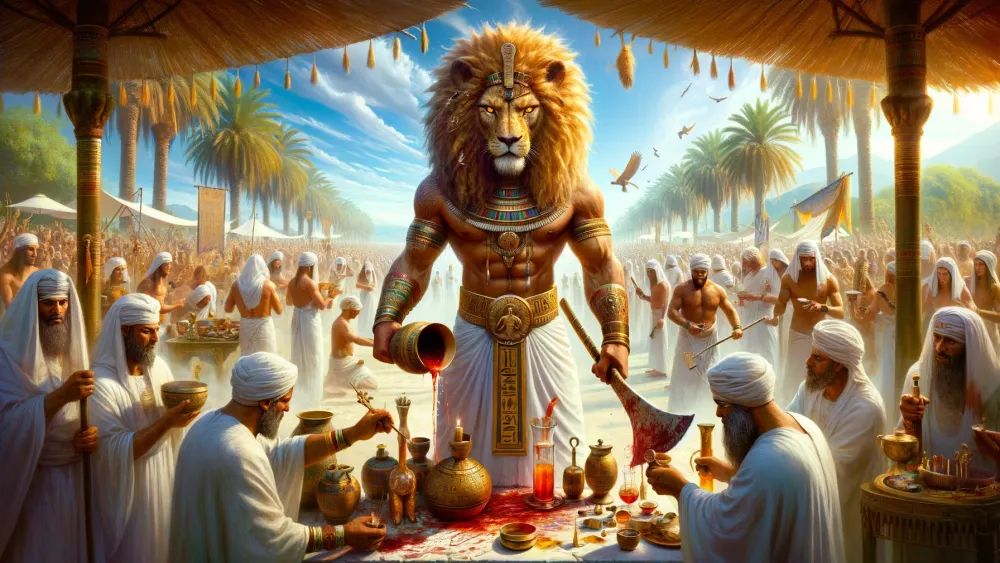
Shezmu’s Veneration in Edfu and Dendera Temples
In the huge temples of Edfu and Dendera, Shezmu’s worship gets really interesting. Edfu, home to Horus, shows off Shezmu in rituals that focus on his protective side. Priests do ceremonies (with wine and oils) to call on Shezmu’s power. Picture a giant kitchen, where priests mix sacred stuff to honor him. The temple’s design (big columns and detailed carvings) mirrors Shezmu’s fierce yet caring nature.
At Dendera, a temple for Hathor, Shezmu shines differently. Here, he is the perfume king. Think of Dendera as a perfume lab, where priests make sweet-smelling offerings. Rituals include crushing flowers and herbs (showing off Shezmu’s skills). The temple’s look (with its fancy reliefs and holy spots) highlights Shezmu’s two sides, mixing beauty with strength.
These practices and designs show how big a deal Shezmu is in both Edfu and Dendera.
Historical Significance and Devotion to Shezmu
Shezmu’s worship twists and turns over time, mirroring changes in Egyptian culture. In the Old Kingdom, Shezmu starts as a scary god of execution. People both fear and respect him. Picture a strict teacher, someone you fear but also respect. As time moves on, Shezmu’s image softens up.
By the Middle Kingdom, he becomes more of a protector and a master of wine and perfume. This shift shows how Egyptian society evolves, mixing fear with admiration. In the New Kingdom, Shezmu’s role grows even bigger. He becomes super important in funerary practices (helping with embalming and guarding the dead). Think of him as a guardian angel, guiding souls to the afterlife.
Temples and texts from this period highlight Shezmu’s two sides, showing his importance in both life and death. These changes in devotion and cultural impact reveal how Shezmu adapts to what people need and believe at different times.
Pantheon of Egyptian Gods
The Egyptian pantheon is like a giant, colorful quilt of gods and goddesses, each with their own cool stories and jobs. From the powerful Ra, the sun god, to the caring Isis, these deities touch every part of life and death. Picture a huge family reunion, everyone has their own role and personality.
To really get into this amazing world, check out this list of all the Egyptian gods. This list includes everyone, from famous gods to those you might not know about, giving you a full view of Egyptian mythology.
FAQs
1. Who is Shezmu in Egyptian Mythology?
Shezmu in Egyptian mythology is a deity known for his dual roles as both an executioner and a god of winemaking and perfume.
2. What is the Symbolism Behind Shezmu’s Dual Nature?
The symbolism behind Shezmu’s dual nature lies in his roles as both a protector of the dead and a fierce executioner, embodying the balance between creation and destruction.
3. What Were Shezmu’s Roles in Winemaking and Embalming?
Shezmu’s roles in winemaking and embalming include overseeing the pressing of grapes for wine and the use of perfumes and oils in the preservation of the dead.
4. How Was Shezmu Worshiped and Where?
How Shezmu was worshiped involved offerings of wine and perfumes, and he was primarily venerated in regions like the Faiyum and temples such as Edfu and Dendera.

